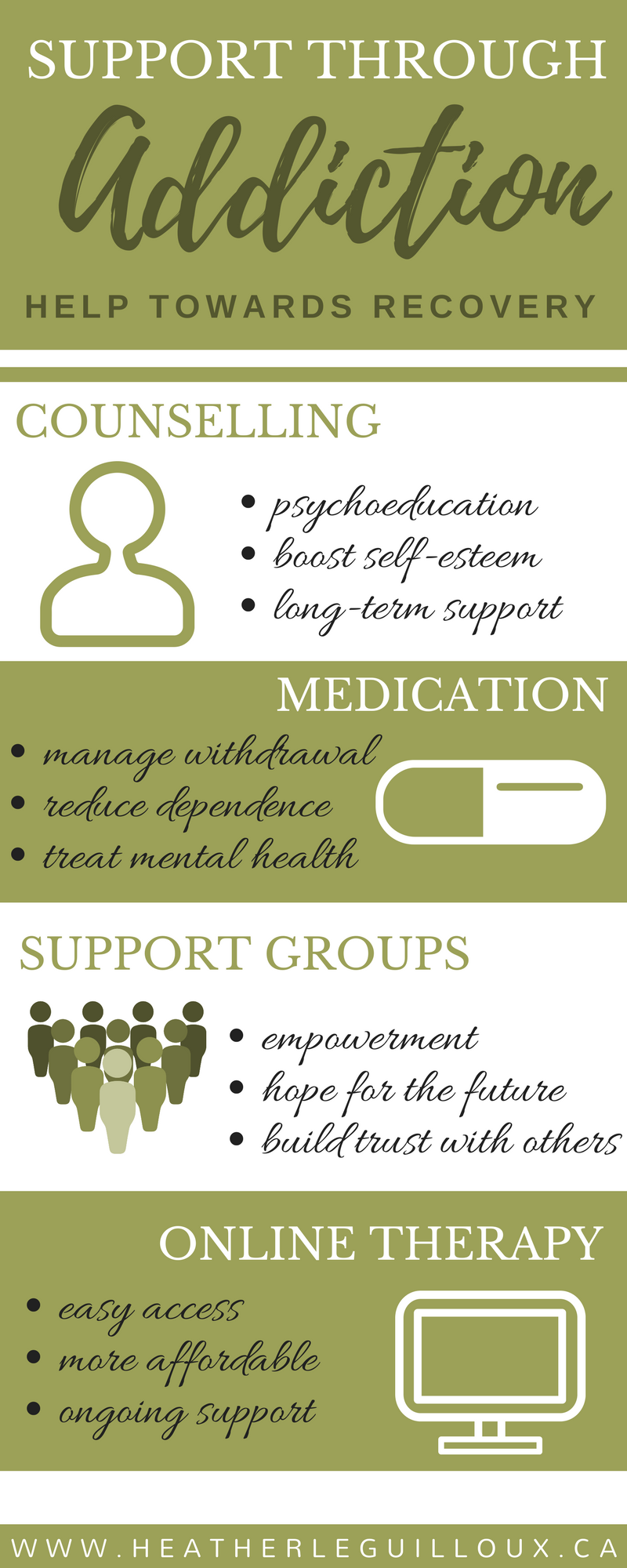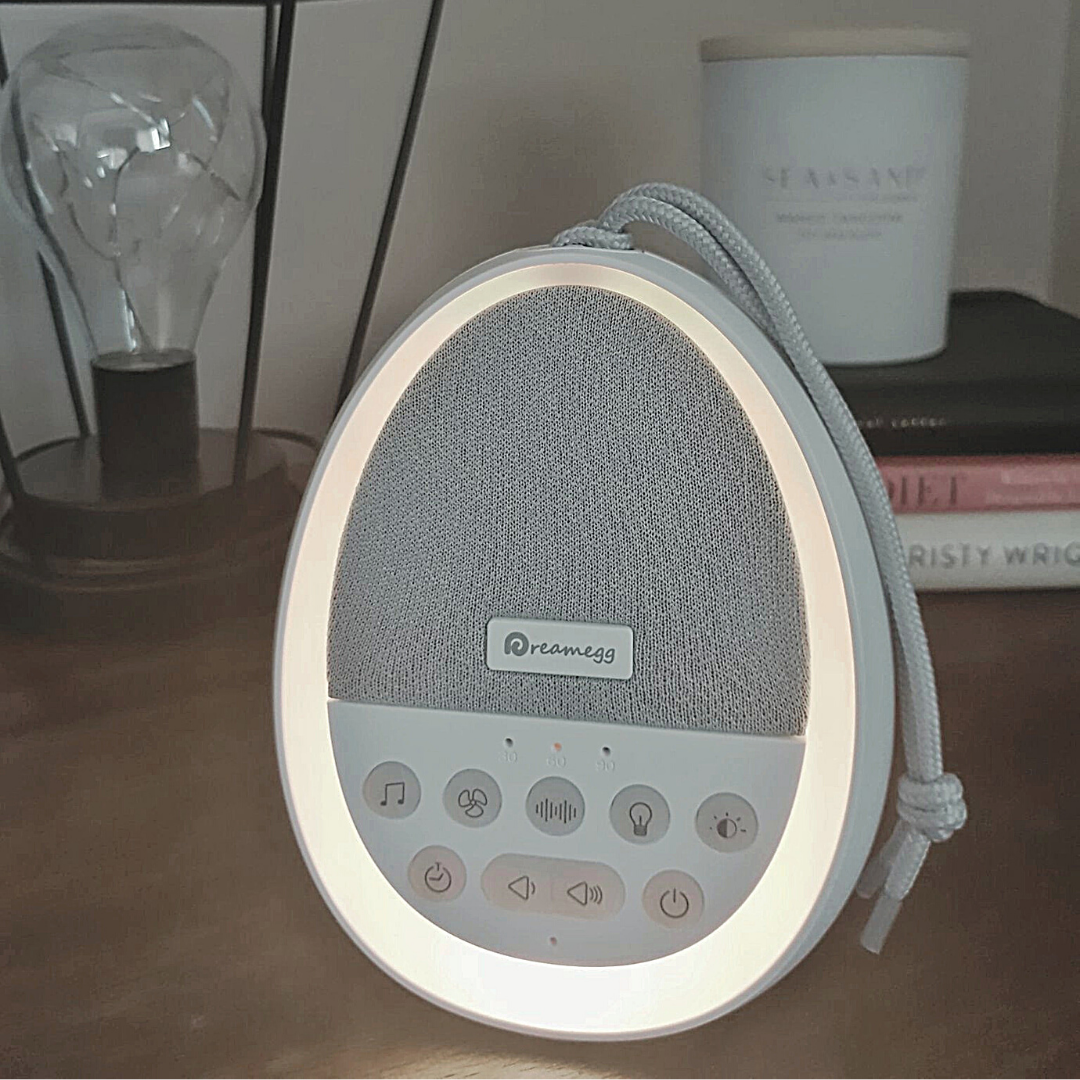|
|Addiction is a term most people are familiar with because of the immense difficulties and emotional heartache associated with going through addiction concerns or knowing an individual who is suffering from the reliance on substances. By gaining knowledge and understanding of the causes, impacts and supports or treatments available, we can all help reduce the occurrence and suffering of those impacted by addiction.
This is the fourth article in a series focusing on addiction. In case you haven't had a chance to read the other posts, you might want to take some time to read through each post, or bookmark the previous articles to read later:
The following article will focus on ways that an individual can find support through their addiction and will highlight the benefits of counselling, medication, accessing support groups, as well as online therapy. This article does not contain medical or therapeutic advice. If you, or someone you know, is concerned about your health and well-being connected to substance use or an addiction, speak with a local healthcare professional, or reach out to specialized support for addiction. Counselling
Accessing counselling or 'talk therapy' can help an individual understand their behaviours and motivations related to substance use as well as the dangers of continuous substance dependence. Long-term counselling can also be beneficial for discovering ways to cope and manage stress or other mental health concerns as well as helping to improve self-esteem and empowering an individual to create positive and ongoing changes in their life.
Accessing counselling services is generally through outpatient or community-based services, or inpatient or hospital- or treatment-based services. Outpatient Support is provided through private or community-based professional counsellors (eg. psychotherapist, psychiatrist, etc) with a focus on addiction recovery. The therapeutic framework and model used can vary widely and may depend on the agency or may be chosen by the individual accessing therapy. Inpatient An individual may be treated at a hospital or treatment center, especially if the individual requires psychiatric or medical care. Stays may be short-term and focused on crisis support, or an individual may stay 6-12 months or longer in a treatment center for long-term care and support. In addition, family members and friends who are connected to the individual with the addiction may also choose to access their own counselling in order to have support for their own well-being and to learn ways of supporting their loved one towards recovery while maintaining boundaries. Medication
A doctor or inpatient treatment protocol may prescribe an individual diagnosed with an addiction disorder with medication to help control the cravings related to substance reliance, as well as manage the withdrawal symptoms of reduced substance use.
For example, medications for alcohol withdrawal syndromes include benzodiazepines that act on receptors in the brain to stimulate release of a neurotransmitter that is responsible for decreasing activity throughout the nervous system and acts to gradually detoxify the patient from alcohol by reducing heart rate, blood pressure, sweating, and anxiety associated with alcohol withdrawal. During detoxification benzodiazepines are systematically decreased to address the most important need, which is to prevent the occurrence of seizures and delirium. Medication can improve treatment outcome but should only be used on a short-term basis. Support Groups
12-step support groups or programs such as Alcoholics Anonymous (AA) or Narcotics Anonymous (NA) can be a great option for an individual who feels encouraged by connecting with others who have similar substance use issues and motivated to also make changes in these behaviours.
In addition, support groups or programs generally include being assigned a peer who has completed the initial phase of the program and can be an accountability partner for the individual accessing support. This connection can act as an empowering and safe way to let someone else who can understand how difficult it can be to go through treatment and recovery know that you're 'not okay' and need more help at times. Tip: If you are a loved one who is supporting a friend or family member with an addiction, consider a health promotion perspective of help. Online Therapy
Therapy is no longer only accessible by driving to an office since the internet has opened up the possibility of accessing ongoing therapy at the touch of a button. There are many benefits of online therapy including providing a convenient way to access support in an increasingly busy world, as well as offering more affordable options compared to traditional therapy.
Talkspace This online therapy service starts with an online assessment which will help you to gain access to a therapist who matches with your support needs and who will communicate with you through message or video chat. Talkspace is a great option to connect with a therapist through reliable and accessible online therapy for help with mental health concerns, including addiction issues. Download the Talkspace app to get started: As you can see, there are lots of different ways of accessing support and treatment to work towards achieving recovery - each individual will need to walk their own path of recovery after reaching out for help. It's also important to note that relapse is generally a part of the addiction recovery process, and having preventative plans and supports in place can reduce the chance of relapsing.
Support Resources
If you are looking for more support, a great place to start is to contact your local alcohol and substance help line (a quick google search in your area may help you find one) or speak to your doctor about these concerns and request a referral for more support.
If you are located in British Columbia, Canada click here for help options, or check out the helpful links page for more options.
References: psychiatry.org, samhsa.org, ncbi.nlm.nih.gov
MENTAL HEALTH RESOURCE VAULTGreat!Check your email for instructions on how to access the Mental Health Resource Vault. :) Additional Addiction Support Links:
This article is a sponsored post. The links on this page may be embedded with affiliate links that I am compensated for at no additional cost to you. If you or someone you know is in crisis and need immediate support, please reach out to your local emergency service or crisis line.
14 Comments
3/26/2018 09:30:36 am
I really want to thank you for this series. I have a family member that we recently discovered is battling a very serious addiction to opiates. It has been a really stressful time but your posts have helped me through. Thanks again for providing support for people going through this, or those of us supporting someone we love through this
Reply
4/7/2018 04:27:13 pm
You are very welcome, Lisa. It can be so tough to see a family member going through an addiction and it's important to remember to take care of yourself, as well.
Reply
4/7/2018 04:30:06 pm
Absolutely, Jessica. It's often said that addiction is a family concern because the impacts can have ripple effects. I hope that you and your family have some support to get through. Take good care!
Reply
4/7/2018 04:43:00 pm
Thank you for your kind words, Kay! I hope the article was helpful for you.
Reply
4/7/2018 04:43:46 pm
Yes, that is true, Jasmine. My hope is that by talking about concerns like addiction and mental health, it can help those who are suffering in silence to have a voice and reach out for support.
Reply
4/7/2018 04:44:14 pm
You are very welcome, Kaitlyn! Thank you for stopping by the blog.
Reply
4/7/2018 04:45:25 pm
Hi Ben, it's good to hear that there are good experiences having support from groups. I think it can help to know that there are others going through similar struggles and to be able to offer support to each other.
Reply
5/10/2018 06:12:00 am
Addiction affects so many more people than anyone could ever imagine. From a recovering addict, this was a great article. It was awesome that you included that family members need support too. Addiction affects the family which in return can have an even harder impact on the addict in regards to their family's reaction to their addiction. Keep writing amazing posts Heather! Love it.
Reply
3/5/2020 09:06:39 pm
Addiction can definitely tough on so many more people than just the individual going through the substance abuse issues. I'm so glad that these articles have been helpful to share with others, and thanks so much for your comment!
Reply
Your comment will be posted after it is approved.
Leave a Reply. |
Welcome to the blog!↓ That's me, Heather. :)
MENTAL HEALTH RESOURCE VAULTGreat!Check your email for instructions on how to access the Mental Health Resource Vault. Categories
All
Popular Posts// 25 Positive Mindset Quotes
// Self-Care Bullet Journal Spreads // 7 Ways Your Physical Health is Connected to Your Mental Health |






 RSS Feed
RSS Feed
















